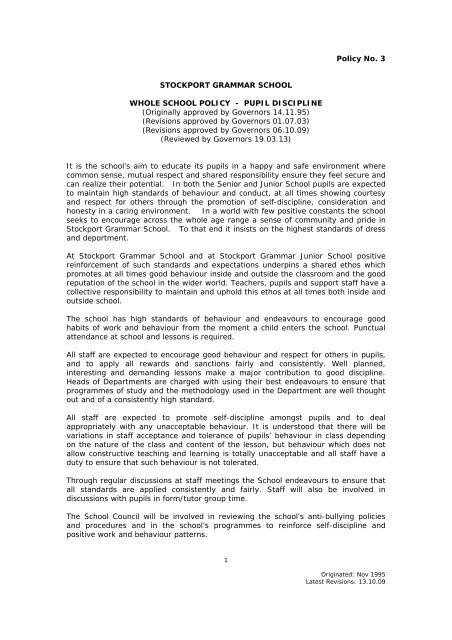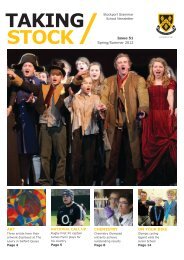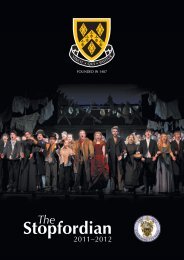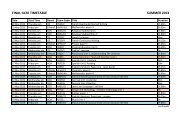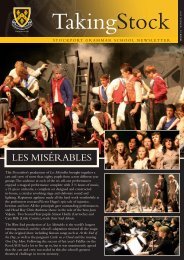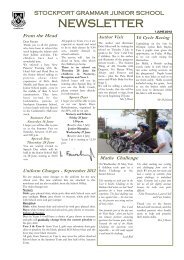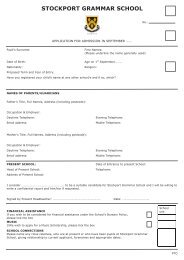Download the pupil discipline policy (pdf) - Stockport Grammar School
Download the pupil discipline policy (pdf) - Stockport Grammar School
Download the pupil discipline policy (pdf) - Stockport Grammar School
Create successful ePaper yourself
Turn your PDF publications into a flip-book with our unique Google optimized e-Paper software.
Policy No. 3<br />
STOCKPORT GRAMMAR SCHOOL<br />
WHOLE SCHOOL POLICY - PUPIL DISCIPLINE<br />
(Originally approved by Governors 14.11.95)<br />
(Revisions approved by Governors 01.07.03)<br />
(Revisions approved by Governors 06.10.09)<br />
(Reviewed by Governors 19.03.13)<br />
It is <strong>the</strong> school’s aim to educate its <strong>pupil</strong>s in a happy and safe environment where<br />
common sense, mutual respect and shared responsibility ensure <strong>the</strong>y feel secure and<br />
can realize <strong>the</strong>ir potential. In both <strong>the</strong> Senior and Junior <strong>School</strong> <strong>pupil</strong>s are expected<br />
to maintain high standards of behaviour and conduct, at all times showing courtesy<br />
and respect for o<strong>the</strong>rs through <strong>the</strong> promotion of self-<strong>discipline</strong>, consideration and<br />
honesty in a caring environment. In a world with few positive constants <strong>the</strong> school<br />
seeks to encourage across <strong>the</strong> whole age range a sense of community and pride in<br />
<strong>Stockport</strong> <strong>Grammar</strong> <strong>School</strong>. To that end it insists on <strong>the</strong> highest standards of dress<br />
and deportment.<br />
At <strong>Stockport</strong> <strong>Grammar</strong> <strong>School</strong> and at <strong>Stockport</strong> <strong>Grammar</strong> Junior <strong>School</strong> positive<br />
reinforcement of such standards and expectations underpins a shared ethos which<br />
promotes at all times good behaviour inside and outside <strong>the</strong> classroom and <strong>the</strong> good<br />
reputation of <strong>the</strong> school in <strong>the</strong> wider world. Teachers, <strong>pupil</strong>s and support staff have a<br />
collective responsibility to maintain and uphold this ethos at all times both inside and<br />
outside school.<br />
The school has high standards of behaviour and endeavours to encourage good<br />
habits of work and behaviour from <strong>the</strong> moment a child enters <strong>the</strong> school. Punctual<br />
attendance at school and lessons is required.<br />
All staff are expected to encourage good behaviour and respect for o<strong>the</strong>rs in <strong>pupil</strong>s,<br />
and to apply all rewards and sanctions fairly and consistently. Well planned,<br />
interesting and demanding lessons make a major contribution to good <strong>discipline</strong>.<br />
Heads of Departments are charged with using <strong>the</strong>ir best endeavours to ensure that<br />
programmes of study and <strong>the</strong> methodology used in <strong>the</strong> Department are well thought<br />
out and of a consistently high standard.<br />
All staff are expected to promote self-<strong>discipline</strong> amongst <strong>pupil</strong>s and to deal<br />
appropriately with any unacceptable behaviour. It is understood that <strong>the</strong>re will be<br />
variations in staff acceptance and tolerance of <strong>pupil</strong>s’ behaviour in class depending<br />
on <strong>the</strong> nature of <strong>the</strong> class and content of <strong>the</strong> lesson, but behaviour which does not<br />
allow constructive teaching and learning is totally unacceptable and all staff have a<br />
duty to ensure that such behaviour is not tolerated.<br />
Through regular discussions at staff meetings <strong>the</strong> <strong>School</strong> endeavours to ensure that<br />
all standards are applied consistently and fairly. Staff will also be involved in<br />
discussions with <strong>pupil</strong>s in form/tutor group time.<br />
The <strong>School</strong> Council will be involved in reviewing <strong>the</strong> school’s anti-bullying policies<br />
and procedures and in <strong>the</strong> school’s programmes to reinforce self-<strong>discipline</strong> and<br />
positive work and behaviour patterns.<br />
1<br />
Originated: Nov 1995<br />
Latest Revisions: 13.10.09
Policy No. 3<br />
Parents will be involved in <strong>discipline</strong> cases as appropriate. Individual staff should not<br />
involve parents in <strong>discipline</strong> issues without first informing <strong>the</strong> Head of Year, Head of<br />
Section or Proctor. Parents are also encouraged to support good behaviour and<br />
positive habits in <strong>the</strong>ir children.<br />
All rewards and sanctions must be applied fairly and consistently and in accordance<br />
with <strong>the</strong> school’s equal opportunities <strong>policy</strong>. A child will not be subject to disciplinary<br />
action where a failure to meet <strong>the</strong> school’s requirements or contravention of rules is<br />
a direct consequence of that child’s disability. None of <strong>the</strong> school’s punishments will<br />
be degrading or humiliating.<br />
Rewards<br />
Wherever possible staff should use <strong>the</strong>ir own reward systems to encourage good<br />
behaviour.<br />
The rewards used by <strong>the</strong> school include: <strong>the</strong> use of verbal praise, merit awards,<br />
letters of commendations, Headmaster’s Commendation, prize awards.<br />
Sanctions<br />
Sanctions should be applied when rewards have failed, or where it is necessary in<br />
<strong>the</strong> circumstances to show appropriate disapproval. In accordance with <strong>the</strong> law <strong>the</strong>re<br />
is no corporal punishment allowed by <strong>the</strong> school.<br />
Teachers advise form tutors or class teachers of instances of misbehaviour and of<br />
any sanction imposed. Serious instances of misbehaviour should be referred to a<br />
Deputy Head who will take action as required and advise <strong>the</strong> Headmaster<br />
accordingly.<br />
In <strong>the</strong> Senior <strong>School</strong>, <strong>the</strong> form tutor consults with <strong>the</strong> Head of Year and <strong>the</strong> Head of<br />
Section on behavioural and work-related issues where <strong>the</strong>ir involvement is<br />
considered necessary and beneficial. In <strong>the</strong> Junior <strong>School</strong> a breach of <strong>discipline</strong> may<br />
be referred to <strong>the</strong> class teacher, <strong>the</strong> Infant Co-ordinator, Deputy Head or<br />
Headmaster as necessary.<br />
Where <strong>the</strong>re is serious concern, <strong>the</strong> parents are informed and involved in <strong>the</strong><br />
correction process so that <strong>the</strong> <strong>pupil</strong> is aware that school and home are working<br />
closely toge<strong>the</strong>r in his or her best interests. Referral to parents is, in itself,<br />
considered a significant sanction and may be an effective deterrent.<br />
The sanctions applied in both schools include <strong>the</strong> withdrawal of free time, separation<br />
from peers for a prescribed period and <strong>the</strong> withdrawal of privileges. In <strong>the</strong> Senior<br />
<strong>School</strong> free time withdrawn is given over to community service, after-school<br />
detention or Saturday morning detention. Parents are informed if a <strong>pupil</strong> is required<br />
for detention.<br />
A Senior <strong>School</strong> <strong>pupil</strong> may also be placed on daily report for behaviour, which should<br />
not be confused with <strong>the</strong> daily work report scheme. Where a <strong>pupil</strong>’s work is<br />
unsatisfactory, teachers may require that work to be repeated, set impositions or<br />
detain <strong>pupil</strong>s after school provided twenty four hours notice is given to parents.<br />
2<br />
Originated: Nov 1995<br />
Latest Revisions: 13.10.09
Policy No. 3<br />
In more extreme instances a <strong>pupil</strong> may be excluded from tuition or where <strong>the</strong><br />
requirements of <strong>the</strong> school or its rules have been seriously contravened, <strong>the</strong><br />
Headmaster has <strong>the</strong> power to suspend a <strong>pupil</strong> or to recommend to <strong>the</strong> Chairman of<br />
Governors that a <strong>pupil</strong> be expelled.<br />
Where it is apparent that a <strong>pupil</strong> has become a constant source of frustration to<br />
subject teachers, form tutor, class teacher in <strong>the</strong> Junior school, <strong>the</strong> Head of Year, <strong>the</strong><br />
Head of Section or a Deputy Head, <strong>the</strong> Headmaster may, having consulted with<br />
parents and previously issued three formal written warnings, recommend to <strong>the</strong><br />
Chairman of Governors that that <strong>pupil</strong> be suspended forthwith and that such<br />
suspension lead to expulsion. Any formal warning may be rescinded if <strong>the</strong> <strong>pupil</strong><br />
evinces sustained betterment.<br />
The procedure for expulsion and any subsequent appeal is set out in a separate<br />
<strong>policy</strong> document. Fur<strong>the</strong>r details on <strong>discipline</strong> approaches and procedures are given<br />
in <strong>the</strong> Senior and Junior <strong>School</strong> Staff Handbooks.<br />
3<br />
Originated: Nov 1995<br />
Latest Revisions: 13.10.09


